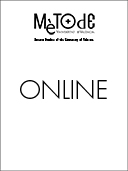Scientific ethos and the cinematic zombie outbreak: Science in fictional narratives
DOI:
https://doi.org/10.7203/metode.6.4472Paraules clau:
rhetoric of science, frontier of science, science fiction, viral pandemics, public attitudes toward science Resum
Resum
Public anxiety about emerging biothreats is evident in the recent glut of popular entertainment where the demise, or near demise, of humankind is imagined to be the result of a new infectious pathogen against which science has no existing vaccine or cure. This article examines the figure of the scientist in such fictional narratives and what these characterizations indicate about public attitudes toward science in our contemporary world. It focuses in particular on the image of the scientist as clumsy naïve, immoral experimenter, heroic savior, and self-reflexive ethical agent.
 Descàrregues
Descàrregues
 Referències
Referències
Boluk, S., & Lenz, W. (2010). Infection, media, and capitalism: From early modern plagues to postmodern zombies. The Journal for Early Modern Cultural Studies, 10, 126–147.
Boyle, D. (Director), & Macdonald, A. (Producer). (2002). 28 days later [motion picture]. United Kingdom: Fox Searchlight Pictures.
Ceccarelli, L. (2013). On the frontier of science: An American rhetoric of exploration and exploitation. East Lansing, MI: Michigan State University Press.
Collins, F. S. (2005, August 7). Exploring the frontiers of life: Northwest at forefront of pioneering effort to mine the secrets of the human genome. The Seattle Times. Retrieved from: http://www.seattletimes.com/opinion/exploring-the-frontiers-of-life
Forster, M. (Director), Bryce, I., Gardner, D., Kleiner, J., & Pitt, B. (Producers). (2013). World War Z [motion picture]. United States: Paramount Pictures and Skydance Productions.
Halperin, V. (Director), & Halperin, E. (Producer). (1932). White zombie [motion picture]. United States: A Victor and Edward Halpern Production.
Haynes, R. (2003). From alchemy to artificial intelligence: Stereotypes of the scientist in Western literature. Public Understanding of Science, 12, 243–253. doi: 10.1177/0963662503123003
Klosterman, C. (2010, December 3). My zombie, myself: Why modern life feels rather undead. New York Times. Retrieved from: http://www.nytimes.com/2010/12/05/arts/television/05zombies.html?pagewanted=all&_r=0
Lawrence, F. (Director), Goldsman, A., Heyman, D., Lassiter, J., & Moritz, N. H. (Producers). (2007). I am legend [motion picture]. United States: Warner Brothers Pictures.
Romero, G. A. (Director), Hardman, K., & Streiner, R. (Producers). (1968). Night of the living dead [Motion Picture]. United States: An Image Ten Production.
Watts, E. K. (2014). ‘The incessant moan’: Reanimating zombie voices. Carroll C. Arnold Distinguished Lecture 2013. Washington D. C.: National Communication Association. Retrieved from: https://www.natcom.org/uploadedFiles/Convention_and_Events/Annual_Convention/NCA Manuscript 2014_FINAL.pdf
Weingart, P. (2003). Of power maniacs and unethical geniuses: Science and scientists in fiction film. Public Understanding of Science, 12, 279-287. doi: 10.1177/0963662503123006
Descàrregues
Publicades
Com citar
-
Resum1620
-
PDF 1677
Número
Secció
Llicència
![]()
Tots els documents inclosos en OJS són d'accés lliure i propietat dels seus autors.
Els autors que publiquen en aquesta revista estan d'acord amb els següents termes:
- Els autors conserven els drets d'autor i garanteixen a la revista el dret a la primera publicació del treball, llicenciat baix una llicència de Reconeixement-NoComercial-SenseObraDerivada 4.0 Internacional de Creative Commons, que permet a altres compartir el treball amb un reconeixement de l'autoria del treball i citant la publicació inicial en aquesta revista.
- Es permet i s'anima els autors a difondre la versió definitiva dels seus treballs electrònicament a través de pàgines personals i institucionals (repositoris institucionals, pàgines web personals o perfils a xarxes professionals o acadèmiques) una vegada publicat el treball.





